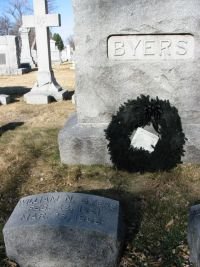The Rocky Mountain News, the oldest newspaper in Colorado, is for sale. Far from being a portent of strength and prosperity, it seems that in Denver's 150th year, the Rocky could be in its final one.
I have long and fond memories of the Rocky. In elementary school in Summit County, it was the newspaper we read once a week. I loved its tabloid format, which meant easy handling for my small arms, the only "grown-up" newspaper that I could easily manage.
That simple tabloid format was like a friendly little welcome to me, and when I got older, I naturally sought its familiar form as my newspaper of choice. The Denver Post was bulky, and its fonts looked foreign and stand-offish. I understood the Rocky, I knew its rhythms. It was a comfortable, old friend that I recognized even when I'd not picked it up in years.
In high school, I sat in football games and graduations (including my own) at Damon Runyon field, long before I knew anything about him or his role with the Rocky Mountain News. I knew of
Harvey long before I knew of Rocky writer Mary Coyle Chase.
As an adult, I admit, I adored the largest comic section in any daily I've ever seen. Sure, the Post had Dilbert, but, that was a small loss in the overall comics war. Gene Amole and Dusty Saunders were must reads.
When it was announced that the two newspapers in Denver were going to be merged, and a joint operating agreement was going into effect, I feared only doom for the Rocky. The E.W. Scripps Publishing Company, which now owned both papers, assured us "Denver is still a two paper town! Nothing will change!" Riiiight. Was that a *Sunday* Rocky Mountain News you wanted?
Soon after the merger, I stopped taking the newspaper. I didn't really want it any more. In part, it felt like drinking the Kool-Aid (Should I say, instead, "Unbranded fruit drink made from powdered concentrate?"). The other part was that I wasn't reading much of the paper beyond the comics and the columnists that I really liked. I, like so many others, was finding more relevant news from other sources on the internet. I still read my favorite columns online. Admittedly, it was no longer a regular habit. Clearly, the declining revenue at the paper is all my fault. I've betrayed my good friend.
And, yet, betrayal aside, I didn't miss the paper. Comics and columns online were actually *archived.* If I missed a day, I could catch up. (And I didn't have to waste a single bit of bandwidth for Rex Morgan, M.D.)
This is happening to newspapers all over the country, and while I can't claim to have brought my mighty newspaper slaying ability to bear in every instance, the story is not new. Newspapers have struggled to understand and compete with the internet as a news source. The delivery model and revenue sources are completely different. Simply taking the print publication online is not the answer.
It is likely too late to save the Rocky, and I'm sad that it wasn't able to adapt to stay ahead of the extinction comet. At the same time, the big old comet worked out okay for everyone, right? Well, except the dinosaurs.
(Speaking of dinosaurs, I actually prefer my dinosaurs in natural history museums and Spielberg films, so, I'll stop being distracted and go back to talking about newspapers...)
What are some lessons that newspapers could learn?
* Stop covering everything. Newspapers always try to cover everything, which means having the same re-hashed Associated Press stories that every other paper had. Part of this was to "keep up appearances" of having "all the news," and part of it was to keep the correct content-to-ad ratio. Now, anyone can find those AP stories themselves, directly from the AP, so there's no reason to carry them.
* Go with your strengths. Sounds cliché, but, the things I most valued and associate with the Rocky? Columnists and Comics. They were things I could get no where else, and still seek out to this day. Eliminate anything that is mediocre and irrelevant. Unique and excellent content is valuable content.
* Information not data. I can get data anywhere, from a zillion different sources. What I can't get is information. I need insight. I want experts who tell me what something means, and how to make sense of all the data. I need a trusted source that helps me understand.
* Find a niche. This may sound like a combo of the first two, but, it's more than that. Covering a niche that is under-represented can be a gold mine. Probably, it can even be something that the newspaper did the occasional story on, but, never put much effort into. Like local governments. Civic groups. What rich content could a team of experienced journalists find if they stopped paying attention to the same things everyone else is watching? Be the first source your audience thinks of for information on the local government, and focus on following it better than anyone has ever followed it. Get those microscopes out, and expose corruption or sing the praises of things that are working really well. The key is depth, not breadth.
The deadline for the Rocky is tomorrow. The Rocky Mountain News reported today that E.W. Scripps has asked potential buyers to submit bids for the newspaper by close of business on Friday, when it will begin evaluating the offers. I wish my friends at the Rocky well, and may they find a home.
Note: There is a group of Rocky staffers working to save the paper, if you are interested, check out:
http://www.iwantmyrocky.com/Labels: Colorado, Columns, Rocky Mountain News

